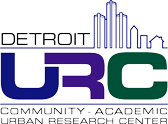Detroit URC, Poverty Solutions award $79,500 to 3 community-academic research projects
Three collaborative teams of University of Michigan researchers and community partner organizations have been awarded $26,500 grants each for research projects focused on evaluating and strengthening interventions, programs, and policies that seek to prevent and alleviate poverty in Michigan.
These research projects will take place in 2020, and mark the fourth round of community-academic grants awarded through a joint initiative between the Detroit URC and Poverty Solutions at the University of Michigan. For more information about the program, including previous grantee teams, please visit this link.
The grant proposals funded were selected based on multiple factors. These included: the quality of the research design (including the appropriate research methodology); feasibility of completion of the proposed study during the funding period; relevance of proposed research effort to communities involved; extent and feasibility of community and academic partner involvement; and degree to which the study builds knowledge about the effectiveness of interventions, programs and policies seeking to reduce or alleviate poverty.
The AfricanFuturist Greenhouse
This proposal will combine the African traditions of generative economy with contemporary technology design to create an AfricanFuturist greenhouse. The greenhouse exterior will be designed by local artists from the African American community to provide aesthetic fit to the museum surroundings. The interior will be designed and prototyped by University of Michigan students, such that it can grow the plant materials for bead creation. It will also supply fresh vegetables and, from an aquaponics tank, fresh fish. By using photoelectric and thermal solar energy, as well as a rain catchment system, the team will create a small scale model for what could become a broader set of self-sufficient, sustainable urban practices that restore the links between living, making and growing which is so important to Indigenous traditions.
Of central importance, these Indigenous traditions of generative economy include reciprocal relations between human and nonhuman value generation. This project will update that using contemporary techniques to grow the feedstock that becomes the beadwork and other adornment sold in the bead museum. Add the technology of solar power, rain catchment, agricultural robotics and AI soil monitoring, and we have a platform for bringing together Detroit economic and resource needs with U-M innovation and experimentation.
Ron Eglash, University of Michigan School of Information
Audrey Bennett, University of Michigan Penny W. Stamps School of Art and Design
Olayami Dabls, MBAD/ABA African Bead Museum
Special Delivery: A Community Academic Partnership to Improve the Health of Low-Income Young Mothers and their Children
The goal of this project is to assess the feasibility of using grocery delivery to strengthen WIC services by improving access to and use of food benefits during pregnancy. Grocery delivery, a well-established and inexpensive service, removes logistical barriers to obtaining healthy foods but is underused by low-income populations. The objective of this work is to evaluate whether young pregnant women want and are able to order WIC-covered foods online (feasibility/acceptability) and whether doing so impacts their diet and weight gain during pregnancy. The researchers hypothesize that online ordering of WIC-covered foods will be convenient and will increase consumption of fruits and vegetables. These findings will provide critical evidence to the USDA and State WIC agencies on the impact of expanding online ordering of groceries to include WIC beneficiaries as it currently only allows for some SNAP (food stamp) beneficiaries.
The aims of this project are two-fold. Firstly, researchers will examine the feasibility and acceptability of online ordering of WIC-covered foods measured by both: 1) the number of young pregnant women who are successfully able to independently order online, and by 2) interviews to assess their satisfaction with the process. Secondly, using text message surveys and automated home scales, researchers will assess the impact of food delivery on diet quality and weight gain during pregnancy among young pregnant women age 14-24 years of age, living in three Michigan counties: Genesee, Wayne, and Washtenaw.
Gayathri Akella, Washtenaw County Health Department WIC
Tammy Chang, University of Michigan Department of Family Medicine
Marika Waselewski, University of Michigan Department of Family Medicine
Poverty Alleviation through Entrepreneurship and Urban Microenterprise Development
Over the past decade, there has been an increase in the number of microenterprise development and neighborhood entrepreneurship training programs in Detroit. The impetus of these programs is to stimulate urban economic development and neighborhood revitalization in the city's underserved communities.
The aim of this study is to evaluate these programs collectively with respect to outcomes of new venture growth, wealth creation, and upward economic mobility in these communities. Specifically, this study seeks to understand and explore the impact of these programs on low- to moderate-income entrepreneurs in these communities and discover best practices in urban entrepreneurial development and wealth creation. Since the primary thrust of entrepreneurship is value creation, the goal of this study is to examine how entrepreneurship can catalyze upward economic mobility among low- to moderate-income individuals in an urban environment.
Marcus D. Harris, University of Michigan-Dearborn College of Business
Michael Gordon, Stephen M. Ross School of Business at the University of Michigan
Nicole Farmer, Grand Innovation
April Boyle, Build Institute
Jacquise Purifoy, Build Institute
Crystal J. Scott, University of Michigan-Dearborn College of Business
Jeffrey Robinson, Rutgers Business School
The Detroit URC is a partnership of representatives from the Detroit Health Department, Henry Ford Health System, eight community-based organizations (CBOs) in Detroit, and faculty members from the U-M Schools of Public Health, Social Work, and Nursing. The CBOs are: the Community Health and Social Services Center, Inc.; Detroit Hispanic Development Corporation; Detroiters Working for Environmental Justice; Eastside Community Network; Friends of Parkside; Institute for Population Health; Latino Family Services; and Neighborhood Service Organization.



